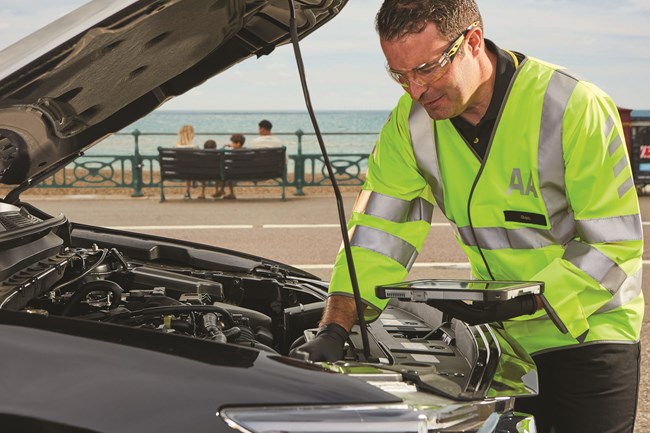We use cookies to ensure that we give you the best experience on our website. If you continue without changing your settings, we will assume that you are happy to receive all cookies on the Business Car website. However, if you would like to, you can change your cookies at any time

The start point for the best source of fleet information |
ADVERTISEMENT FEATURE: Alternative fuels: how to thrive
Date: 06 December 2022

Amidst the current political and economic turmoil the UK faces, our country's transition to electric vehicles continues to move forward at a rapid pace. As the UK's leading breakdown provider, and as more people each day adopt electric vehicles, we want to ensure we're continuing to provide innovative support to help make businesses' transition to electrification a smooth journey every step of the way. That's why our latest yellow paper, 'Alternative Fuels: Thriving in a Changing Landscape', sets out a road map to help businesses adapt their fleets ahead of ?the 2030 deadline, while also exploring some of the questions many businesses have around the future of our roads.
Funding the EV future
At this moment, EVs are not a financially viable option for everyone. However, as electrification becomes more of a reality for drivers each day, an increasing number of payment options are emerging that mean a driver does not have to buy an EV outright. These include leasing and even subscription services.
EV leasing
Leasing an EV depends on a monthly payment cycle, which runs between two to four years, and it can often prove more competitive than buying outright. The benefit of leasing is it protects drivers and businesses from vehicle depreciation, although many EV models are continuing to hold their values well on the used market. The leasing option is becoming increasingly popular to boost the affordability of EVs worldwide, and it is more common in legislation than ever before. Taking France as an example, they're currently preparing to launch an EV subsidy programme that would give drivers from low-income households the option to lease an EV for ?100 a month.
Car ownership for the Netflix generation?
In much the same way you can pay for an Amazon Prime or Netflix subscription, a growing number of businesses now offer drivers a subscription service. These low commitment deals, which can be cancelled at a month's notice, often include a number of extras in a monthly payment too, including charging electricity, insurance and maintenance. A number of OEM subscription models have also entered this marketplace. Some deals allow you to switch between vehicles as part of your subscription. Overall, subscription can offer drivers and businesses more flexibility than leasing.
Servicing EVs
Just like traditional ICE vehicles, EVs require regular servicing and checks. Prestige Fleet Servicing, part of the AA, is already seeing more electric vehicles coming into its AA Approved Garages network, as we support fleets with their transition. For businesses considering, or those who already have electric vehicles, we recommend applying the same disciplines for EVs as they would do for ICE vehicles:
- Plan ahead - there are fewer EV-capable garages in the UK compared with ICE, so it's important to work with your fleet management provider to ensure they have service, maintenance and repair (SMR) coverage local to your drivers.
- Garage capability - ensure your SMR provider has the right equipment, and their technicians are trained to the appropriate level (minimum of Level 3). Having to move vehicles to another provider due to lack of capability will only increase downtime.
- Be proactive - Monitor SMR spend by vehicle type and telematics data to identify trends and any areas of concern. Electric vehicles are well-known for their rapid acceleration, which places increased stress on tyres. By combining with telematics data, you can quickly identify drivers with a heavy right foot who could benefit from additional training interventions.
Driver training
To an untrained driver, the instant acceleration of an EV can come as a surprise, which consequently could be detrimental to a business's reputation in the event of a crash. Regenerative braking is another issue with the potential to confuse new EV drivers. This leads us to the driver training offered by Drivetech, part of the AA, which is helping businesses and fleets to make the transition to EVs safer. Driver training not only builds confidence and familiarity with new technology - it also has the potential to save lives. Additionally, it boosts driver awareness of risk and instils a mindset of tailoring driving habits to save money by conserving the power used.
The evolution of taxation
The move to alternative fuels will also see taxation evolution. AA president Edmund King is calling for the government to introduce a 'Road Miles' system, giving drivers a tax-free mileage limit, after which they are charged per mile. Drivers would then think about the journey they're undertaking - including business drivers - while promoting the use of cleaner, greener vehicles, which would pay less.
With you every step of the way
We're all on our own journey to net zero, and as the nation's number one breakdown provider, we want you to know that we're here to ensure your part in making our country a vehicle innovation leader is easy.
To find out more about AA Business Services, and to download the yellow paper, please visit: https://www.linkedin.com/showcase/the-aa-business-services/
For media enquiries, please contact Prova Public Relations on 01926 776 900 or email theaa@provapr.co.uk











